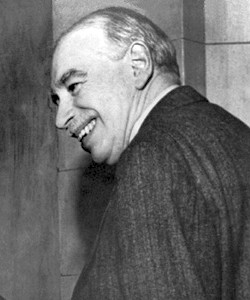Well. His name and economic theory is being bantered around so much I thought it well to look into what is on the internet and here’s what I found. To my surprise the IMF is very much a part of this picture . . . as we go down this Keynesian rabbit hole.
I personally agree with the critics who say government intervention into the economy is wrong and the people will hold back from spending and therefore the economy will go into an inflationary spiral as currency proliferates. My analogy: THE WELL INTENTIONED ALLOPATHIC DOCTOR. The patient comes with a stomach ache. The doctor give something like Prilos__. Problem solved until the patient comes in complaining of indigestion and gas. The doctor orders something else. Then the patient comes in complaining of weakness, inflammation and fever and the doctor gives him something to put down his immune system. For awhile the patient is better until he catches the flu and dies. Moral of the story. Support the body’s own ability to heal itself vs.intervention which confuses the body’s ability to heal itself.
Also, be sure to check out Glenn Becks 9 points after reading this. And be sure to read about the IMF forcing 14 banks to close in Indonesia causing a run on the banks. Now for the story of the economic intervention of the day.
John Maynard Keynes.
In the wake of the Financial crisis of 2007-2008 the free-market consensus began to attract negative comments even by main-stream opinion formers from the economic right. In March 2008, free-market guru Martin Wolf, chief economics commentator at the Financial Times, announced the death of the dream of global free-market capitalism, and quoted Josef Ackermann, chief executive of Deutsche Bank, as saying "I no longer believe in the market's self-healing power."[15] Shortly afterward economist Robert Shiller began advocating robust government intervention to tackle the financial crisis, specifically citing Keynes.[16][17] A series of major bail outs followed starting on September 7 with the announcement that the U.S. government was to nationalise the two firms which oversaw most of the U.S. subprime mortgage market—Fannie Mae and Freddie Mac. In October, the British Chancellor of the Exchequer referred to Keynes as he announced plans for substantial fiscal stimulus to head off the worst effects of recession, in accordance with Keynesian economic thought.[18] Similar policies have been announced in other European countries, by the U.S., and by China. [19] This is in stark contrast to the action permitted to Indonesia during its financial crisis of 1997, when it was forced by the IMF to close 16 banks at the same time, prompting a bank run.[20]
Prominent Keynesian economists included Paul Krugman, Robert Reich and Joseph Stiglitz. Greg Mankiw argued that Keynes was the economist who gave the greatest single insight into the crisis [21], but later encouraged skepticism about a fiscal stimulus.[22]

The works on Keynes of Hyman Minsky[23], Robert Skidelsky[24], and Donald Markwell[25] were widely cited. Much discussion reflected Keynes's advocacy of international coordination of fiscal or monetary stimulus, and of international economic institutions such as the International Monetary Fund and World Bank, which he had helped to create at Bretton Woods in 1944, and which many argued should be reformed at a 'new Bretton Woods'.[26] This was evident at the G20 and APEC meetings in Washington, D.C., and Lima, Peru, in November 2008, and in coordinated reductions of interest rates by many countries in November and December 2008. IMF and United Nations economists and political leaders such as British Prime Minister Gordon Brown advocated a coordinated international approach to fiscal stimulus.[27] The President of the World Bank, Robert Zoellick, advocated that all developed country pledge 0.7 percent of its stimulus package to a vulnerability fund for assisting developing countries.[28]
Keynesian thinking was reflected in the U.S. President Barack Obama's appointments of Lawrence Summers, Timothy F. Geithner, and Christina Romer to principal economic positions in his administration. In a speech on January 8, 2009, President Obama unveiled a plan for extensive domestic spending to combat recession, further reflecting Keynesian thinking. The plan has been approved by the House of Representatives and early indications are that it could pass through the Senate ready for President Obama's signature by mid Febuary 2009 [29] The $819 billion package comprises an estimated $275 billion in tax cuts and $544 billion in a mix of spending that will include energy, infrastructure, health care, tax cuts and direct payments to the unemployed and disadvantaged. [30] [31] There was extensive debate about its necessity, adequacy, and likely effects.
Criticism
For policy makers and their supporters around the world, Keynesian solutions are currently seen as representing the best option for shielding their populations from arbitrary market-forces; and possibly as engines for addressing inequality, achieving social progress and accelerating the transition to a green economy.
Nevertheless the Keynesian revival has attracted heavy criticism. It is questioned by commentators on the left whether the Keynesian resurgence has been sufficiently strong - in their view Obama's economic team is disappointingly centrist, with its inclusion of liberal leaning economists like Jason Furman. [32] [33] Also there is Germany whose administration, according to some, stands out in their reluctance to wholeheartedly embrace Keynesian policy [34]. From the right, some commentators assert the late 2000s crisis was caused not by excessively free markets but by the remnants of Keynesian policy , for example the Federal Reserves interventionism in the early 2000s which encouraged the sub-prime lending boom.[35] Most critics focus on arguing that Keynesian policy will be counter productive - as it will be inflationary, cause consumers to rein in their spending even more as they anticipate future tax rises, as well as various other technical reasons. [36] [37]
[polldaddy poll=1362796]
Technorati tags:
Stimulus,
Furman,
Keynesian,
financial system,
Sarkozy,
Keynes,
IMF,
International Monetary Fund,
Martin Kettle,
Taxes,
spending,
sub-prime lending,
free markets,
supply side economics










![Reblog this post [with Zemanta]](http://img.zemanta.com/reblog_b.png?x-id=df4c88b6-8302-4cd8-8bfe-4b4fb7085d70)


![Reblog this post [with Zemanta]](http://img.zemanta.com/reblog_b.png?x-id=7e33db85-3cd9-4a92-90fb-21043ef1dfc1)

![Reblog this post [with Zemanta]](http://img.zemanta.com/reblog_b.png?x-id=ccd70cde-bb48-487e-8e22-d8f8d09ab2e2)



